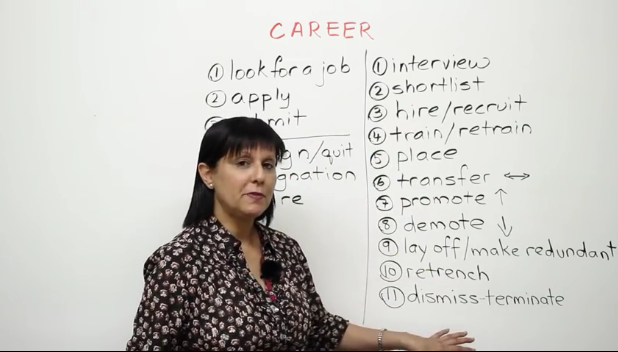(单词翻译:单击)
Next: we come to different ways in which a person can be asked to leave work.
接下来,我们将谈论员工被要求离职的几种不同方式。
There are three different ways, so let me explain because the difference is actually very important.
有三种方式,因为这三种方式差别很大,所以我会一一解释。
A person might be "laid off". Another way to say that is "to make someone redundant".
一个人可能会“下岗”。另一种表达方式是“裁退”。
A person might be laid off or made redundant. I'll explain what that means.
一个人会下岗会被裁退。稍后我会解释各自的含义。
A person might be "retrenched" or "dismissed" or "terminated".
一个人可能会被“裁退”或“解雇”或“开除”。
Now, let me explain the difference. When companies lay off employees, they don't usually lay off one employee.
现在我来解释其中的不同。当公司员工下岗,通常不会是一名员工。
They lay off a number of employees, sometimes it could be a hundred employees, it could be a thousand employees.
而是有大量员工下岗,有时可能是百人或是千人。
And why does that happen? It has nothing to do with employee performance, it has to do with other... other reasons.
那么为什么会发生这种情况呢?这和员工表现无关,是由于其它一些原因。
The economy may be bad or the sales may be down, and so on. And so the company is forced to lay off hundreds of workers. Right?
比如经济不景气或是销售下滑等等。所以公司就会裁员百名员工。
So when the company lays off a number of workers, then they are telling them to go, but again, it's only temporarily.
当公司裁掉这些员工时,会让他们离开公司,但这只是暂时性的。
Usually it's temporarily. Sometimes if the... economy continues to be really bad, it can become permanent, but layoffs are often temporary.
通常会是暂时性的。有时如果经济一直不景气,就有可能是永久性的了,但是裁员通常是暂时的。
Sometimes when things improve, then they may be rehired. So if someone is laid off, it's much easier for that person to get another job because if they're fired,
如果情况好转,那么还会再雇佣他们。所以如果某人被裁员,会比较容易找到另一份工作,因为如果他们是被开除的话,
for example, then that's going to be more difficult for them to get another job.
那么再找工作会比较困难。
All right. Now, next one is "retrench". When a company retrenches employees, it's similar to the layoff, but it's for different reasons.
下一个是“裁退”。当公司裁退员工时,这个和裁员很像,但是其中原因却完全不一样。
Retrenchment happens when a company is trying to restructure itself, reorganize its finances.
通常在公司结构、资产重组时会发生裁退。
And so, it may decide to reduce expenses in a number of different ways.
公司可能会决定以不同方法节省开支。
Sometimes it does it by shortening working hours, by lowering salaries,
有时会通过减少工作时间、降低薪酬,
and finally, if they have no choice and no other way to save enough money, they may actually ask employees to go.
最后,如果没有别的选择,他们会减少员工。
So those employees would then be retrenched. Again, it doesn't usually just happen to one person at all, it happens to many people, maybe hundreds.
所以这些员工会被裁退。同样,裁退不会只发生在一个员工身上,很多人会被裁退,可能上百人。
So layoffs and retrenchments are similar, except that retrenchment is often looked at, technically, as more permanent, and layoffs, as I mentioned, might be temporary.
裁员和裁退相似,只是裁退相对来说更可能是永久性的,而裁员如我所说可能是暂时性的。
The next situation is No.11 here, is a person could be "dismissed" or "terminated".
下一个情况是第11点,员工可能会被“解雇”或“开除”。
And what does that mean? Okay? That means something quite different from being laid off, because when you're laid off, as I said, it's not your fault.
这意味着什么呢?这和裁员完全不同,因为当你被裁员,并不是你有什么过错。
But if you're dismissed or terminated, it may be because the company is specifically unhappy with that person's performance,
但是如果你被“解雇”或是“开除”,可能是因为公司对员工的表现非常不满意,
or that person is perpetually late, or that person's work is not up to standard, and so on. Right? So the company dismisses that particular person.
或是因为这名员工总是迟到,再或者是员工工作达不到要求等等。 所以公司解雇了这名员工。

The official word for that is to be "dismissed" or to be "terminated". The slang for that is to be "fired" or "sacked".
官方词汇是“解雇”或“开除”。俗话说“炒鱿鱼”。
In North America, the slang is "to be fired". In England, the slang tends to be "to be sacked". All right?
在北美,俗话说“to be fired”,而在英国则是“to be sacked”。
So that's what can happen from the employer's point of view. Let's go back for a minute and talk about a few other things that the employee can do.
以上是从雇主的角度来看会发生什么情况。接下来我们来看看员工可以做些什么。
Sometimes, you may get a better job and so you decide to leave the company where you work and go to another company, so you "resign".
有时,你可能会获得一份更好的工作,因此,你决定离开公司去另一家公司,那么你就要“辞职”。
This is something you do by yourself. You decide to resign. The slang for that is to "quit". "I quit", famous words.
这是需要你自己做的事情。你决定离职。俗话说“退出”。“我退出”,经典词汇。
So, if you decide to resign, you will probably submit a letter of resignation. All right? That goes with resigning.
你决定辞职,你可能会提交辞呈。
And the last thing that an employee usually does, - it depends on what age in different countries -, is to "retire".
员工通常会做的另一件事——这取决于不同国家的年龄规定——就是“退休”。
So what does it mean "to retire"? "To retire" means to stop working because you've reached an age when, legally, you are forced to stop working.
“退休”指什么呢?“退休”指因为你到了一定的年纪需要停止工作了,法律上来讲,有点被迫停职工作的意思。
And these... the age varies in different countries, but it can be anywhere from 60 to 65 in most places.
退休年龄每个国家各不相同,但大部分国家是60-65岁。
All right? Of course, if you work for yourself, you may never retire.
当然如果你自己是老板,你永远不会退休啦。
And in other countries, the retirement age might be quite different. All right?
在其他国家,退休年龄可能完全不一样。
So, this is some essential vocabulary that you need to be able to talk about your business life, your working life, your career. All right?
那么以上就是谈论你的工作、职业生涯会用到的必备词汇。
If you would like to do a quiz on this subject, please go to our website: www.engvid.com.
如果你想做相关小测试,请登录我们的网站:www.engvid.com
Thank you very much for watching, and good luck with your career. Bye for now.
谢谢观看,祝你工作顺利。我们下期见。


